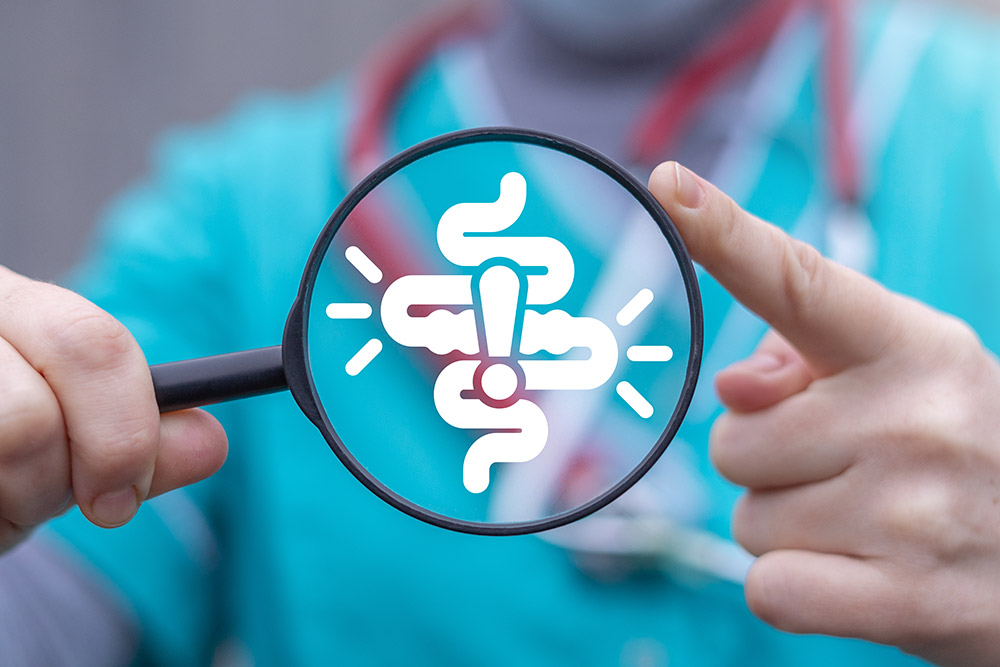What Is Celiac Disease?
Celiac disease is a chronic autoimmune disorder where the ingestion of gluten (a protein found in wheat, barley, and rye) triggers an immune response that damages the small intestine lining. This damage impairs nutrient absorption and can lead to various gastrointestinal and systemic symptoms.
Common Causes and Risk Factors
- Genetic predisposition (family history of celiac disease)
- Presence of other autoimmune disorders (e.g., type 1 diabetes, thyroid disease)
- Early gluten introduction in infancy (controversial factor)
- History of gastrointestinal infections
- Down syndrome or Turner syndrome
Signs and Symptoms
- Chronic diarrhea or constipation
- Abdominal pain and bloating
- Unexplained weight loss
- Fatigue or weakness
- Iron-deficiency anemia
- Dermatitis herpetiformis (itchy skin rash)
- Delayed growth or puberty in children
How Dr. Rishi Diagnoses Celiac Disease?
Dr. Rishi uses a step-by-step approach:
Medical History and Symptom Review
He evaluates your dietary habits, family history of autoimmune conditions, and symptoms like digestive issues, fatigue, or rashes.
Blood Tests
We perform serologic tests to detect specific antibodies such as tTG-IgA and EMA, which are commonly elevated in celiac disease.
Genetic Testing (if needed)
HLA-DQ2 and HLA-DQ8 gene testing may be done to support diagnosis, especially in unclear cases or if antibody tests are inconclusive.
Endoscopy with Biopsy
- Upper endoscopy is performed to visually inspect the small intestine.
- Biopsies are taken from the duodenum to confirm villous atrophy — a hallmark of celiac disease.
Gluten Challenge (in certain cases)
If the patient has already been avoiding gluten, Dr. Rishi may recommend a temporary gluten challenge before testing to ensure accurate results.
Frequently Asked Questions
How is celiac disease diagnosed?
Through blood tests to check for celiac antibodies (like tTG-IgA) followed by a small intestine biopsy via endoscopy.
Can I test for celiac disease at home?
No. Accurate diagnosis requires lab blood work and physician-supervised exams.
What blood tests are used?
The primary test is tTG-IgA along with total IgA levels to rule out IgA deficiency.
What if I already eat gluten-free?
You may need a medically supervised gluten challenge before testing to ensure reliable results.
What is the celiac disease ICD-10 code?
The official code for celiac disease is K90.0.
Can I manage celiac disease in Houston with self-care?
Yes, maintain a strict gluten-free diet and join local support groups for guidance and recipes.
How soon will I feel better after quitting gluten?
Many patients notice symptom relief within weeks; full intestinal healing can take several months.
Are there medicines for celiac disease?
There's no cure yet. Treatment focuses on supplements (iron, vitamin D, calcium) and skin therapies for rashes.
Should I ask about cross-contact when eating out?
Absolutely. Always confirm that restaurants follow strict gluten-free prep to avoid hidden gluten.
Can kids outgrow celiac disease?
No. Lifelong adherence to a gluten-free diet prevents intestinal damage and complications.











